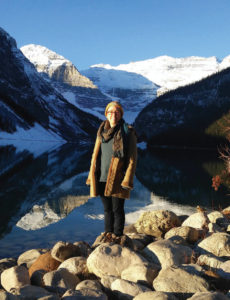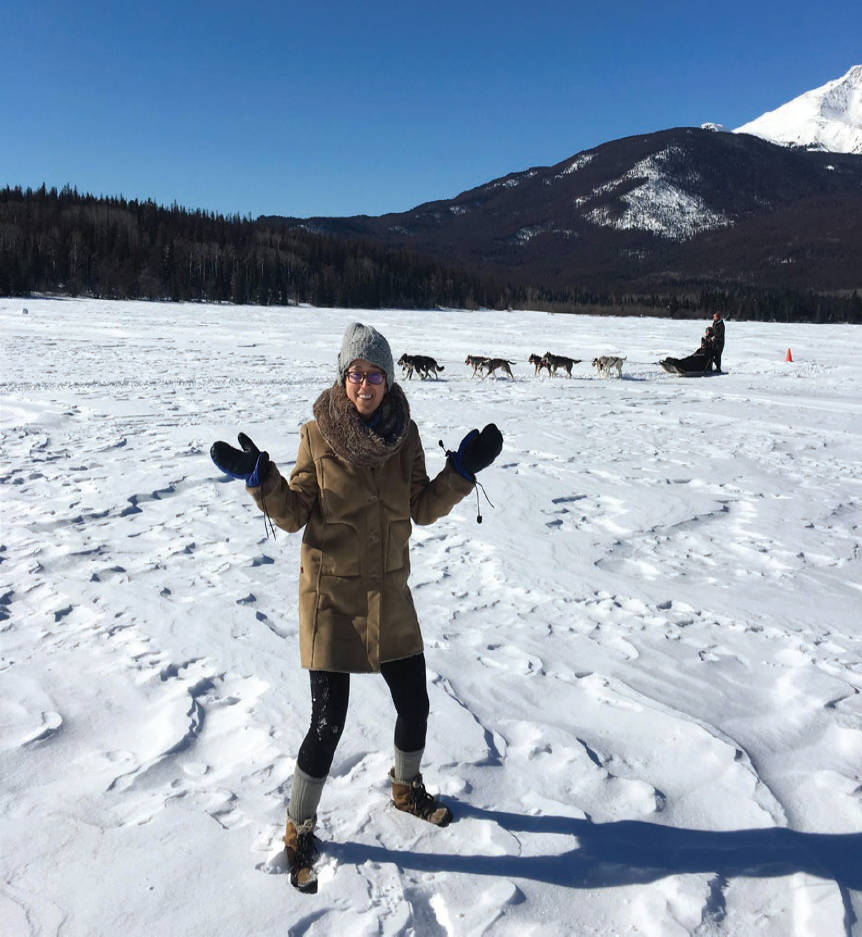
MORE THAN JUST TUMOURS
AN INTERVIEW WITH HANNAH
Hannah lives with NF 1 in Alberta, Canada. Originally from Tennessee, she struggled to build community when she moved to Alberta to pursue a Master’s degree. She shares her insights on navigating life with NF in the following interview with Desirée Sher.
WHEN WERE YOU DIAGNOSED WITH NF?
I’m 32, and I was diagnosed much later then most children are now (I was 8 or 9). I was seeing a neurologist for many years, on the assumption that I had epilepsy. One day, he brought a student-doctor to my appointment to practice a physical exam. While the student was doing the physical, she noticed that I had café au lait spots and freckling in the armpits. She brought my neurologist back in and observed to us that I may have NF. My neurologist ordered an MRI and that’s when we discovered an optic glioma. I remember when the neurologist told us, he was just as shocked as we were to discover I had NF.
 WHAT WAS THE EXPERIENCE OF GOING TO A MULTI-DISCIPLINARY NF CLINIC?
WHAT WAS THE EXPERIENCE OF GOING TO A MULTI-DISCIPLINARY NF CLINIC?
It was really great to have the NF clinic in Nashville. There was one core doctor who is there one day a week for the clinic. He and his secretary help to coordinate all the meetings that you need with other specialists who are connected to the NF field. I never had to wait very long for those appointments, either. An MRI would sometimes just take a day, and I never waited for an appointment for more then a month. With the advent of the clinic, you no longer had to tell your whole story of NF to every doctor you saw, or wonder if your doctor even knew what NF is.
When I was living in Seattle, I went to a regular family doctor about a neurofibroma located next to my spine and he said he could take it off right then, in the small room we were in. I remember looking at him and thinking that he does not know these neurofibromas can bleed and are below the fatty layer of skin. It’s impossible to remove them in just a standard examination room!
It was hard to go from Nashville where I had the clinic as a central hub for all of my NF concerns, and then move to a city where you have to start all over. And it was a bit like that when I moved to Edmonton too. My doctor here is an MS doctor, and he’s willing to work with me, but still isn’t immersed in NF.
HOW DID YOU MAKE THE TRANSITION FROM HAVING A CLINIC OF EXPERTS MANAGING YOUR CARE TO HAVING TO BECOME YOUR OWN EXPERT?
I have a package now for when I see doctors. I have all my medical history, timelines, and a condensed summary so I have everything prepared. Then if a doctor says something to me that I know is wrong, I’m able to refute it. They don’t always like that (some of them get a bit miffed), but it’s my health. There’s only so much that I’m just going to accept. Whenever I have a bad experience with a doctor, I have no problem standing up to them or looking for another doctor. I think that’s more common of an attitude in America than in Canada. But it would be nice if there were more NF clinics in Canada. In Alberta, there are many people with NF but we still have no clinic. It would make sense to have one here.
WHAT HAS BEEN YOUR HARDEST CHALLENGE OF LIVING WITH NF?
The hardest challenge for me was probably seizures and then an optic glioma. But I’m very lucky that those have both stabilized. My current challenge is that I have plexiforms on both of my outer ankles. The one on my right was removed, and the one on the left was small enough that it didn’t need to be removed. The issue with my right leg is that the plexiform has invaded a lot of my muscles so even though it was removed years ago, I’ve now developed a lot of balance issues and pain associated with the plexiform. Some days I can’t walk straight which causes pain in my knee. I have begun to develop osteoarthritis as a result.
As I’ve gotten older, I’ve realized that removing a tumour doesn’t mean that the problem is gone. It’s been ten years now since the plexiform tumour on my ankle has been removed, and it only gets harder every year. I have other neurofibromas along my stomach and spine, so I can’t do some things like sit in some chairs, or carry certain backpacks. Overall, I would say I’m fairly lucky as all of my tumours are subdermal. I’ve never had to face teasing or being ostracized. So I count myself lucky.
HOW DO YOU COPE WITH THE PAIN?
I made a decision to only rely on opioids if absolutely necessary. I actually use a form of meditation and mindfulness to try to separate my brain from the symptoms. I’m not a professional, but I learned through videos and a mindfulness program. When my pain was at its worst, I did microdose with cannabis at night to help sleep.
HOW DO YOU MAINTAIN A POSITIVE ATTITUDE?
I’m a very stubborn person. I think I was just born with tenacity and the ability to speak up. Some people do struggle with their NF and it overwhelms them, but that’s not me. I remember as a kid, my teachers didn’t want me to take any advanced math courses. So I forged my parents’ signature and forced my teachers to allow me to take those courses. I’ve never let NF define or stop me.
WHAT ADVICE WOULD YOU GIVE TO SOMEONE WHO IS STRUGGLING WITH AN NF DIAGNOSIS?
What has always helped me is that I’ve had external passions and developed an identity outside of my NF. You can’t create your own identity; you have to discover it. For example, I love cycling and traveling. Those are my passions that pull me forward.
ANY LAST WORDS?
Through all of these things, I’ve never let my NF stop me. I will say that people do underestimate how many people with NF struggle with learning disabilities and social interaction. There’s much more to NF than just tumours.

